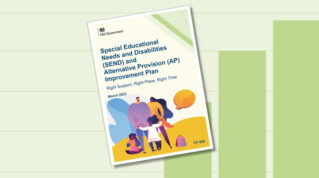Ministers want to “break the link” between pupil movements and alternative provision funding and focus the sector on “early intervention” in mainstream schools, under plans set out in the SEND review.
The review – which looked at both special educational needs and disabilities and alternative provision across England – aims to make AP an “integral part” of local SEND systems and reform the role it plays in the schools community.
Proposals for changes to AP include a new way of measuring the performance of the sector, and plans to review pupil movement and unregistered provision.
Here’s what you need to know about the proposals for AP. You can read about the proposals for the rest of the SEND system here.
1. Focus on early intervention and cut long-term placements
New local SEND partnerships will be required to plan and deliver an AP service focused on early intervention.
Mainstream schools will have a “clear, tiered package of support” from alternative provision settings, including “targeted support” in mainstream schools and “time-limited placements” in AP.
“Longer-term”, transitional placements in AP will only be used when they are in the “best interests” of the child or young person.
Like other schools, the DfE wants all AP to be in a strong multi-academy trust or have plans to join or form one.
2. Funding will no longer follow pupil movement
Ministers say they want to “break the link” between individual pupil movements and funding.
Local partnerships will be required to create an AP-specific budget, “ideally for a minimum of 3 years”.
Partnerships will detail the number of targeted mainstream support places, time-limited placements, and transitional placements necessary to “meet expected needs each year”.
They will agree the cost of each service or placement type that they will provide, and how changes in demand will be managed within the budget.
Councils will then be expected to distribute funding in line with the plan, with funding “no longer following the movement of each individual child or young person”.
3. New performance table for AP
The green paper also proposes a new performance table for AP schools, which will recognise that most children arrive in AP “at a late stage in their education, having already fallen a long way behind their peers”.
A new national performance framework for the sector will be based on five key outcomes: effective outreach support, improved attendance, reintegration, academic attainment, with a focus on English and maths, and successful post-16 transitions.
An expert working group will be set up to assist and advise in developing the framework.
4. DfE to review pupil movements and unregulated provision
The document also proposes a review of “how children and young people move around the school system, including through off-site direction and unregulated managed moves”.
This will be carried out with a view to introducing a “statutory framework” for all pupil movements, which aims to deliver greater oversight and transparency over the process.
The government will also launch a call for evidence before the summer on the use of unregistered provision.
















Your thoughts